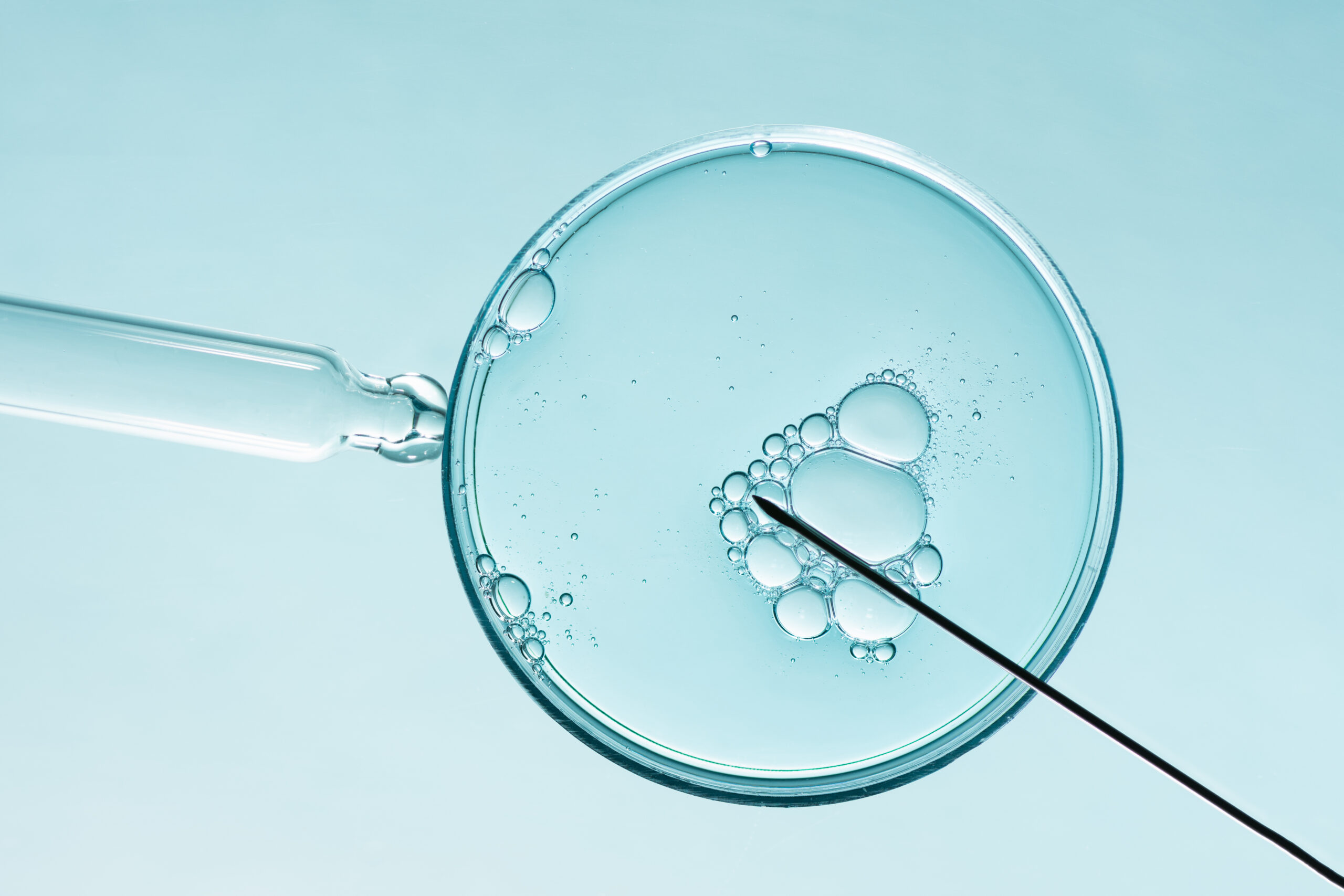If you are struggling to have a baby, there are a variety of fertility treatments which may help. Among the most popular are in-vitro fertilisation (IVF) and intracytoplasmic sperm injection (ICSI).
In this article, we will compare these two fertility treatments; from how they both work and success rates to the benefits, potential risks, and when each treatment should be used.
What is ICSI treatment?
Intracytoplasmic sperm injection (ICSI) is a type of IVF fertility treatment that involves the injection of live sperm into your eggs. The sperm is injected into the cytoplasm of the egg, which is the gel-like substance found in the centre of the egg. This procedure, which is done in a laboratory, creates a fertilised egg (embryo), which can then be transferred to your uterus (womb).
Gynaecology consultant and subspecialist in reproductive medicine and surgery, Mrs Jan Grace explains, “ICSI can be an excellent treatment option when male infertility is preventing you from having a baby.”
What is IVF treatment?
IVF is a treatment that can help with fertility problems. It is made up of a series of procedures. First, mature eggs are retrieved from the ovaries, before being fertilised by sperm in a laboratory. Then the fertilised egg are placed in the uterus. A full IVF cycle takes around three weeks.
Recognised as one of the most effective assistive reproductive treatments, IVF can be done with you and your partner’s own sperm and egg. Alternatively, eggs or sperm may be provided by a known or anonymous donor. There is also the option of using someone to carry a fertilised egg in their uterus – this person is known as a gestational carrier.
IVF is a primary treatment for infertile women over the age of 40 and is also done if a woman has health conditions such as endometriosis, ovulation disorders or damaged fallopian tubes.
ICSI vs IVF
ICSI is a form of IVF treatment. In the same way as IVF, ICSI sperm and eggs are collected from partners or donors and inseminated (fertilised) in a laboratory. After being monitored in an incubator, the best-fertilised eggs are transferred into your uterus.
Where ICSI differs from traditional IVF is the way in which the eggs are fertilised. ICSI injects each egg with sperm individually. This bypasses the stage in IVF in which the sperm naturally penetrates the egg.
ICSI, or ICSI-IVF as it is sometimes known, is typically used by clinics in cases of a man having a very low sperm count, poor sperm movement, or sperm which is abnormally shaped.
Benefits of ICSI treatment
Now we’ve taken an overview of the procedure, let’s pinpoint the benefits of ICSI treatment. These include:
- a higher fertilisation rate for couples struggling due to conceive due to male infertility
- increased the number of high-quality fertilised eggs produced from one egg collection
- suitable for men with a very low sperm count or sperm motility issues
- suitable for men with sperm development problems
- suitable for men with blockages that prevent them from ejaculating
- can help couples with unexplained fertility problems to conceive
- allows couples to have control over the timing of their baby
- can be done with donated sperm and/or eggs
Benefits of IVF treatment
Traditional IVF treatment also has numerous benefits, including:
- better fertilisation and implantation rates than ICSI for couples struggling to conceive due to female infertility
- can help women with a range of health conditions – including endometriosis, ovulation disorders, damaged fallopian tubes, polycystic ovary syndrome and premature ovarian failure – to have a baby
- suitable for older women with a low ovarian reserve
- can help couples with unexplained fertility problems get pregnant
- allows couples to have control over the timing of their baby
- can be done with donated sperm and/or eggs
Risks of ICSI
There are risks associated with ICSI treatment, including:
- a chance (usually less than 5%) that a small number of eggs could be damaged by the needle insertion
- a higher risk of having a baby with a chromosomal abnormality in the X or Y chromosomes than if having a baby with sexual intercourse. Problems associated with sex chromosome abnormalities include a higher risk of miscarriage, infants having heart issues, increased risk of learning or behaviour disabilities, and your child having an increased risk of infertility when they are an adult
Risks of IVF
Among the risks of IVF treatment, some of which are shared by ICSI, are:
- premature delivery and low birth weight
- multiple births, if more than one fertilised egg is implanted in your uterus. Multiple foetuses have a higher risk of early labour and low birth weight
- ovarian hyperstimulation syndrome
- complications stemming from egg collection, including pain, damage or infection of the bladder, bowels or blood vessels
- ectopic pregnancy, which is when the fertilised egg implants outside the uterus and is unable to survive
Summary
If you haven’t been able to get pregnant, ICSI and IVF can both offer effective treatment options. Which one is right for you is likely to depend on the reason you are struggling to conceive, and our specialists are on hand to help you on your fertility journey.
Plan the right path to parenthood by getting in touch with our dedicated customer service team.
Related content
-
Female infertility
Our fertility experts can help diagnose the cause of female infertility.
-
Fertility care
Fertility specialists offering pioneering infertility treatments at the Assisted Conception Unit.
-
Fertility prices
We offer a range of fertility treatment prices and packages to suit your needs. Find out about our transparent fertility costs here.
-
In-vitro fertilisation (IVF)
IVF is one of several fertility treatments designed to help people with fertility issues to conceive.
-
Intracytoplasmic sperm injection (ICSI)
ICSI is a form of in-vitro fertilisation (IVF) fertility treatment.
-
Male infertility
Our fertility experts can help diagnose the cause of male infertility.

